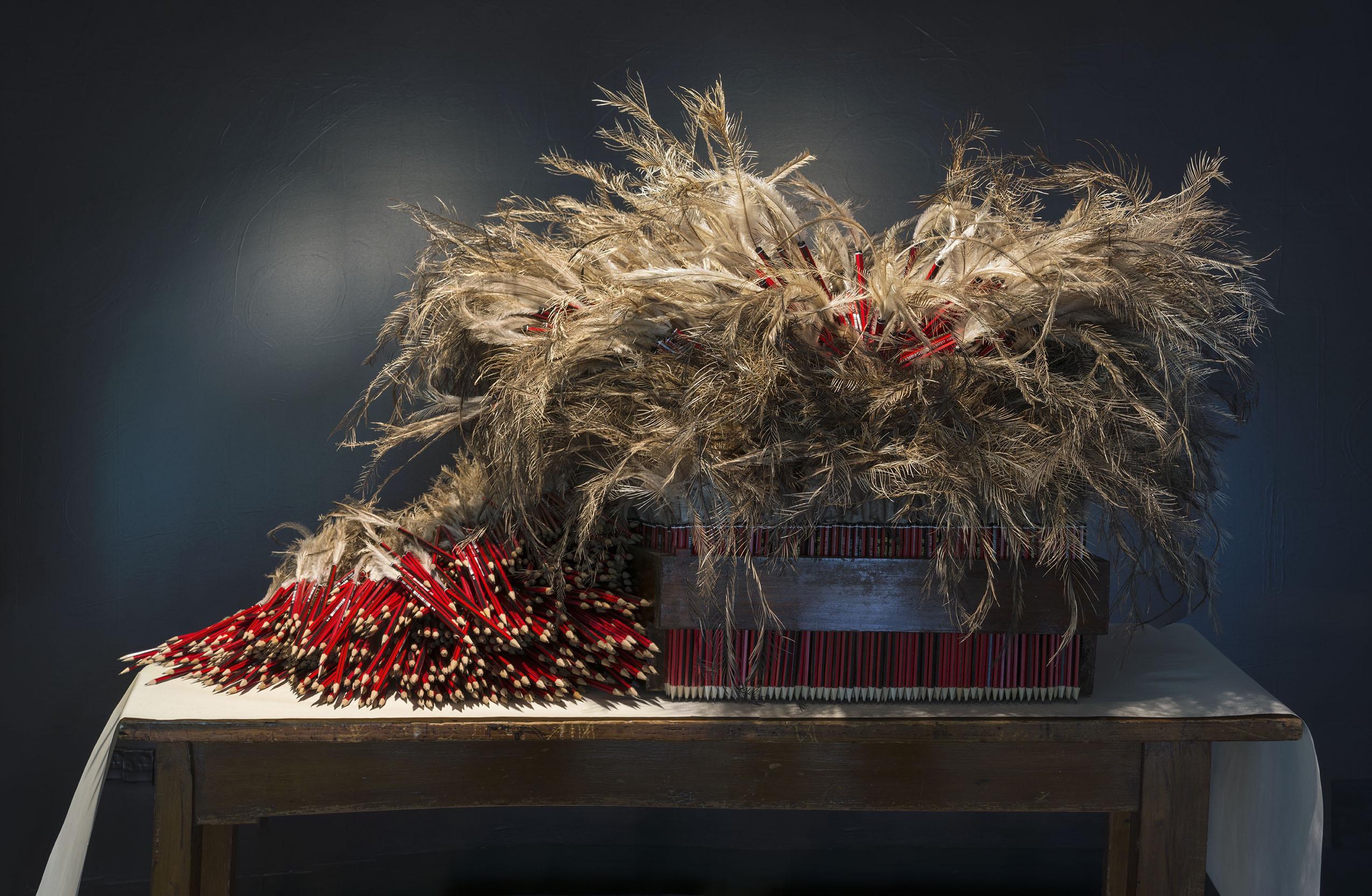Disruptions: A Symposium on the State of Indigenous Art Writing and Research

A symposium celebrating the past, present and future of Indigenous art writing and research.
Carol McGregor (Wadawurrung), not silenced (2013). Courtesy of the artist. 6000 x STAEDTLER pencils, emu feathers, paper, found objects: table and school desk.
A great noise can be heard coming from Indigenous voices. Despite more than 200 years of settler-colonial efforts to silence Indigenous art history, art discourse in Australia and globally is today being electrified and transformed by a new cohort of powerful Indigenous writers. At the same time, Indigenous and non-Indigenous scholars are producing ground-breaking new research into Indigenous art.
This symposium celebrated this moment, drawing together the winners of two prizes administered by the Power Institute between 2017 to 2019 to critically reflect on the past, present and future of Indigenous art writing and research.
Indigenous Art Research: Respect and Relation
Catherine Massola, Mathieu Gallois & Jonathan Jones. Moderated by Stephen Gilchrist.
The Euro-centric discipline of art history has long laid a claim on Indigenous art, yet only recently has it begun to recognise the Indigenous modes of knowledge and sovereignty that this art attests to.
Drawing on their own research experiences, the panellists here will reflect on the disruptive potentials of research on Indigenous art. How can Indigenous archives, perspectives and methodologies destabilise art history’s western bias? What research practices and protocols are necessary for such work? How can institutions and researchers work better to accommodate these needs?
Indigenous Art Writing: Writing Art, Righting Culture
Djon Mundine OAM, Cara Pinchbeck & Kimberley Moulton. Moderated by Clothilde Bullen.
We need to develop a language through which we can critique our own people … You just can’t start hammering away with broad swords independently; there has to be a methodology to it.
-Vernon Ah Kee*
The arts landscape is now shaped by a significant number of Indigenous artists, yet many have publicly decried/identified the lack of Indigenous art writing. Few platforms exist for Indigenous critical writing in Australian and international publications. At the same time, existing Indigenous art writing is often interpreted as being either too uncritical or too dependent on the legacy of the west.
This panel will discuss the state of Indigenous critical writing in Australia today. It will focus on the challenges and achievements of Indigenous scholars and critics, and the ongoing elaboration of a mode of critical writing that centres Indigenous philosophies, protocols and methodologies.
* Quoted in Daniel Browning, “The Dearth of Criticism”, Artlink, 33:2, 2013.
About the Awards
In the years 2017 and 2019, the Power Institute administered two awards, which were generously supported by Copyright Agency Cultural Fund. The prizes sought to foster critical understandings of Australian Indigenous art and culture.
Follow the links below for more information on the winners and their work.
The Power Publications Dissertation Prize for Indigenous Art Research recognised new research and writing on Indigenous art within a scholarly context. It was awarded to the best PhD, DPhil or Master by Research written on Indigenous art. It was not restricted to authors of Indigenous heritage.
The winners of the award were:
- Catherine Massola (2017), for her PhD thesis, Living the Heritage, Not Curating the Past.
- Mathieu Gallois (2018), for his PhD thesis, The Aboriginal Flag.
- Jonathan Jones (2019), for his PhD thesis Murruwaygu: following in the footsteps of our ancestors.
The judges of the award were Professor Ian McLean, Hugh Ramsay Chair of Australian Art History, University of Melbourne and Associate Professor Donna Leslie, Australian Art, Griffith University.
The Power Publications Award for Indigenous Art Writing sought to recognise and encourage the work of Indigenous writers producing compelling, persuasively argued texts, and whose body of work constitutes a rich engagement with visual culture. This prize celebrated a significant contribution made by an Indigenous writer on the topic of Australian art.
The winners of this award were:
- Djon Mundine OAM (2017), for his essay ‘The Aboriginal Memorial: Australia’s Forgotten War’, published in Artlink.
- Cara Pinchbeck (2018), for her essay “Taking Memories Back” published in Art from Milingimbi: Taking Memories Back.
- Kimberley Moulton (2019), for her essay entitled ‘I Can Still Hear Them Calling: Echoes Of My Ancestors’ published in Sovereign Words: Indigenous Art, Curation and Criticism.
The judges of the award were Peter Minter, Clothilde Bullen, Matt Poll, Stephen Gilchrist and Mark Ledbury.
This event is part of the lecture series Linework: Lines, Lineages and Networks in Indigenous Art.
Note on the Artwork
not silenced refers to ‘The Great Australian Silence,’ a term conceived by Australian historian WEH Stanner for his 1968 Boyer lecture series: After the Dreaming. Stanner refers to the prevalent systematic blanketing and omission of Aboriginal histories, perspectives, and stories from accounts of Australian history. He states: ‘Inattention on such a large scale cannot possibly be explained by absent-mindedness.’
The 1000s of STAEDTLER, Australian-made, black and red ‘Tradition’ pencils fitted with emu tail feathers, signify Indigenous understandings, perspectives and narratives that must be told, acknowledged and tabled.


